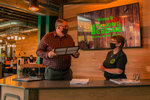


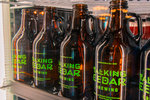

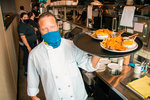
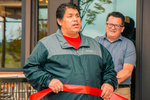
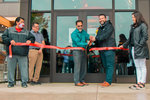

It’s been a long time coming for the Chehalis Tribe with its latest project, the Talking Cedar Brewery and Distillery, and on Tuesday what was once a distant dream became a reality.
Chehalis Tribal members along with representatives of Heritage Distilling Co. out of Gig Harbor, who partnered with the tribe for the distilling portion of the venture, posed for pictures outside the front door of Talking Cedar prior to the ribbon-cutting ceremony to commemorate the grand opening — a historic moment for the Chehalis tribe and tribal nations.
The opening of the distillery-brewery-restaurant was historic because when the Chehalis Tribe first had an inkling of creating such a venue, though they had not realized it yet, it was illegal for tribal nations to distill alcohol based on a federal law that stemmed back to the early 19th century.
According to Harry Pickernell Sr., chairman of the Chehalis Tribe, due to a herculean effort from Congressional District 3 House Rep. Jaime Herrera Beutler, the law was repealed, thus opening up distilling opportunities for all tribal nations, not just the Chehalis tribe.
“I think (Talking Cedar) is going to be the model for every tribal nation out there, now that they have the ability to grow their economy with places just like this,” Pickernell said.
The process of realizing Talking Cedar — from the inception of the idea to the 35,000-square-foot facility located at 19770 Sargent Road Southwest in Rochester opening its doors — took about five years, according to Chris Richardson, managing director for Chehalis Tribal Enterprises.
In between those years the tribe had to narrow down their vision of what exactly they wanted to build, find a partnership (Heritage Distilling Co.), fight for legislation that would make it all legal and construct the building, some of which was put on hold due to the COVID-19 pandemic.
“And it’s not over,” Richardson added, noting that the stills to make the liquor on site, which will be licensed under Heritage Distilling, are being shipped from Italy and likely won’t be operational until September or October.
Talking Cedar will employ about 70 people in the restaurant and brewery areas, according to Richardson, and expects to add an additional 40 workers when the distillery is fully operational.
Inside the venue, the front door enters into a foyer where bottles of Heritage Distilling liquor can be purchased. To the right of the foyer, there is a brewery tasting room that is adjacent to the kitchen which looks out over a dining room. To the left, there is a distillery tasting room along with more indoor seating and outdoor seating on a patio.
Adam Adrian, a consultant for the Chehalis Tribe who was in charge of conceptualizing the restaurant portion of Talking Cedar, said the menu includes American fare that will hopefully appeal to a broad audience.
“The idea behind the food here is that you have a distillery tasting room and a brewery tasting room and we sort of looked at that and said, ‘how can we mesh a menu to appeal to a broad audience for both pubbish-type food and maybe more upscale liquor-type food and melt the menus into one to appeal to all the customer base that is coming in?’” Adrian said.
While Tuesday was intended to celebrate the opening of the physical distillery and brewery, Richardson said the Chehalis Tribe has reason to be excited because they are diversifying their revenue stream outside of casino gaming.
Right now, the marketing plan for Talking Cedar beers is to, first, outfit Chehalis Tribal Enterprises entities like the Lucky Eagle Casino and the Great Wolf Lodge with Talking Cedar taps, Richardson said. Then, they hope to move on to other tribal casinos who might be interested in serving their craft beers.
“By the end of the summer we will be canning probably an IPA,” Richardson said.
Heritage Distilling CEO and co-founder Justin Stiefel, who was in attendance for Talking Cedar’s grand opening, said once the distillery is operational, the tribe will have a bigger opportunity to capitalize on liquor because distilling is a much less saturated market than the craft brewing industry.
“Wineries had their big growth phase and so did breweries, and now it is distilleries (growing) nationally,” Stiefel said.